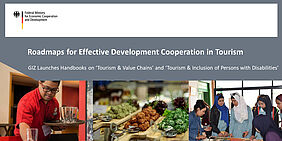The overarching goal is: inclusion. All people should have the opportunity to participate equally in social, economic, and political life to be able to develop their individual potential.
Tourism has particular potential for promoting inclusion and, as a result, contributing to sustainable development in EDCs:
- The industry is labour-intensive and offers persons with disabilities a variety of employment and income-earning opportunities.
- Accessible tourism services enable persons with disabilities to take part in travel and opens up a large market.
- Tourism encourages encounters between persons with and without disabilities. It increases the visibility of persons with disabilities and helps to break down other people’s prejudices and reservations.
- At the same time, the local population can benefit from accessible tourism offerings in the public sphere.
Promoting inclusion in tourism is therefore not just an effective way of reducing poverty and social inequality in EDCs, but also has significant potential to increase economic added value.
With a new handbook, the Gesellschaft für internationale Zusammenarbeit (GIZ) GmbH would like to present approaches how inclusion in tourism can succeed in EDCs. We are very pleased that we were once again able to support GIZ in this project.
The manual is aimed primarily at people working in the field of international development cooperation who are planning and implementing tourism-related interventions as part of projects abroad. It also provides officials in tourism ministries and tourism organisations as well as tourism developers with practical help on promoting inclusion in tourism.
The manual offers:
- a concise introduction to the subject with facts and figures relating to the situation of persons with disabilities worldwide, arguments in favour of promoting inclusion and on the positive role that tourism can play in this respect,
- an insight into the ideal inclusive tourism destination including its various elements, principles, target groups and the subsystems of employment, entrepreneurship, and travel experiences,
- starting points for breaking down crucial barriers and six proposals for highly effective solution strategies,
- guidelines that describe the six steps of the process for developing a cooperation system that will both allow for greater inclusion in tourism on a national level and have a lasting impact.
On 10 March 2021, the handbook was presented at the virtual ITB NOW in cooperation with the Federal Ministry for Economic Development and Cooperation (BMZ). It is now available for download in the GIZ media library: https://mia.giz.de/qlink/ID=247481000 (EN); https://mia.giz.de/qlink/ID=247595000 (GER).
The presentation of the handbook can be visited free of charge on the ITB platform with this code until mid-May 2021: ITBNOW-MALHTRRCCRKCTP4H. Simply order a ticket and enter the code: https://www.itb.com/ITBBerlinNOW/Tickets.
Link to the live stream: https://www.itb-now.com/eventdate/Roadmaps-for-Effective-Development-Cooperation-in-Tourism-New-Handbooks-on-the-Tourism-Value-Chain-and-Tourism-Inclusion-of-People-with-Disabilities--ed_526 (the live stream can best be followed with Google Chrome).
